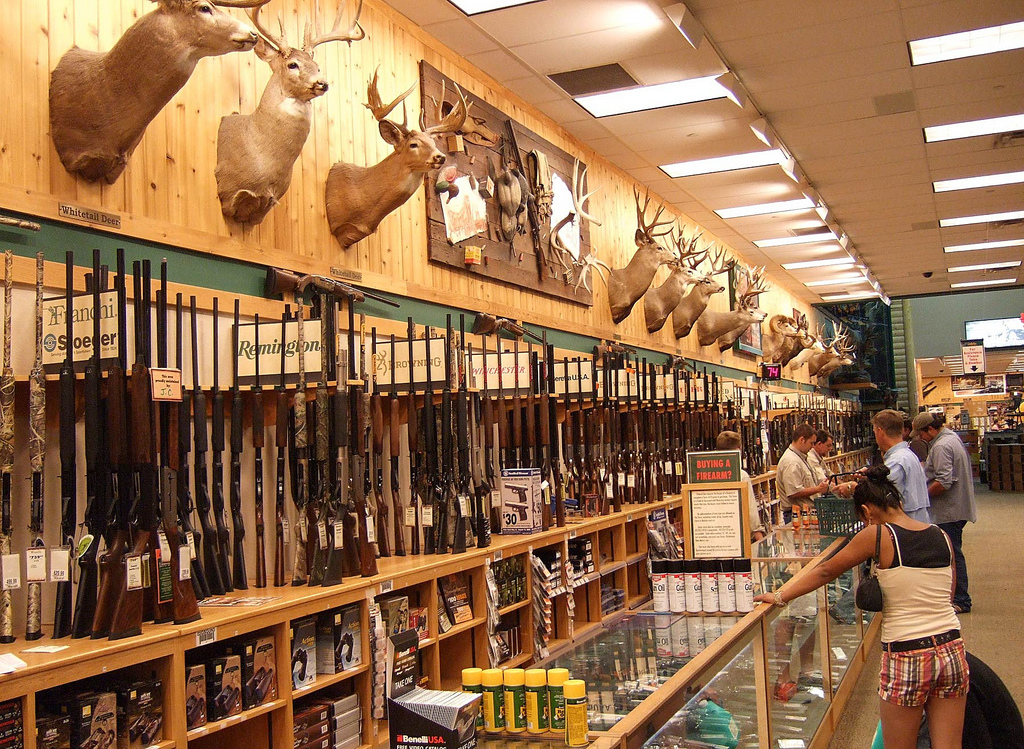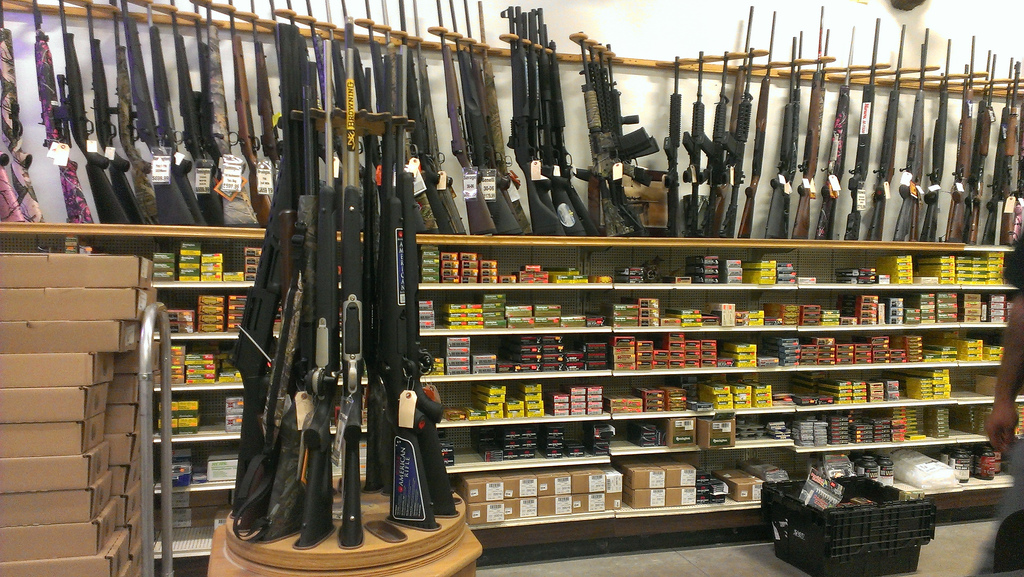
ATF compliance aside, gun stores are still retail businesses. Here are some ways your store can manage and display your firearms and accessories.
As if the ATF wasn’t enough to worry about, you have a retail business to run!
One of the biggest struggles of firearms dealers is the tremendous amount of product you have available to sell. There are hundreds of models of guns and thousands of types of ammunition and accessories.
Even if you only stocked the essentials, that still means a lot of product in your store. Inventory management can quickly become problematic.
Even if you only stock the essentials, gun dealers have a LOT of inventory to carry.
Today we’re going to talk about some critical ways you can manage your inventory. Use these tips to improve your operations and make more money.
Make Connections With Distributors

Buying directly from manufacturers is technically the cheapest way to acquire inventory, but that doesn’t work for many businesses. Manufacturers like to make big sales. They have order minimums, inventory minimums (what you have to keep on hand), and some even require steep application fees to make sure you’re serious about doing business with them. If your store doesn’t do millions of dollars in sales a year, buying from the manufacturer isn’t feasible.
Therefore, it’s smartest to buy from a distributor. They act as your back warehouse. Most keep a website with their current inventory so you can place orders on your own schedule. As long you meet their delivery minimums, you can pick and choose whatever you like (although there will be restrictions in some cases—you can’t buy one box ammunition for example).
It’s smartest to open accounts with several distributors so you have access to any type of firearm, ammunition, or accessory your customers would ever want. Here are the most popular distributors:
Implement a Point of Sale System
A point of sale (POS) system is computerized software that tracks your sales and inventory. The POS system replaces the traditional register. If you have a large store, your POS system could include multiple terminals that feed data into the same system.
POS systems provide a ton of information that you wouldn’t have without them. Because they track what you’ve sold (in terms of units and dollars), they can generate detailed reports on your sales patterns, income, and expenses.
For example, a POS report could tell you which types or models of firearms are purchased more than others, which could influence your ordering. Reports could tell you how much money you collected and profited each day, week, month, or any other interval, or how much you owe in sales tax.
POS systems also make your stock levels easier to manage. If a customer asks if you have an item in the back, you don’t have to tear through boxes. Use the system to set a par level, which is a minimum quantity of a particular product you want to keep on hand. When the par level is reached, the system can notify you so you add it to your next distributor order.
POS systems speed up your sales process, too. Generally these systems come packed with electronic cash drawers, credit card readers, receipt/invoice printers, and barcode readers. Sales speed is important in firearms stores because the customer’s time is already burdened by paperwork and the background check.
Displaying Your Firearms

Image: Sean Savage/Flickr
States have different laws regarding how you can display your firearms in your store. In some states, you are required to implement security measures to prevent theft. That term (“security measures”) is often left intentionally vague, but in many places it means that firearms should be placed in locked display cases or wall-mounted racks behind employee-only counters.
Even if your state allows firearms to be displayed within reach of customers, it’s smart to create an arrangement where they need to speak to you or a store associate to touch them. That way you can make sure that the firearm is unloaded and the potential buyer practices smart gun safety discipline in your store. (Pew Pew Tactical explains the four basic firearms safety rules well.)
In California, Rhode Island, Alabama, New Jersey, Massachusetts, West Virginia, and Pennsylvania, you are not allowed to display firearms so they can be readily seen from the outside. This means no window displays.
California, Washington D.C., and Minnesota have special requirements for how firearms are stored when a business closes. Connecticut and New Jersey require retailers to have burglar alarms connected directly to local police departments.
Add Location Tags in Your A&D Book
Identifying the location of an item can help you control your inventory. Since you already have to go through an acquisitions process with each firearm, it’s simple to add a location tag alongside the entry in your bound book or bound book software.
Designate the display cases, safes, racks, and shelves in your stores with their own names. For instance, you might have Display Case 1, Back Room Safe, Inner Shelf 3, or whatever works for your business. When you input a firearm to your acquisitions ledger, add the location tag nearby. This helps you stay organized in case you ever need to find a particular firearm for a customer or investigator.
If you use FastBound for your A&D books, you can add a custom field for this location tag. Alternatively, any field (name, serial number, manufacturer, etc.) is searchable.
Prioritize Compliance Above All Things

Image: Brian Ambrozy/Flickr
It’s important to always consider your relationship with the ATF, even if you don’t appreciate the demands they place on your business. At the end of the day, a string a violations can put you out of business, so staying compliant is the best investment you can make. ($250,000 fines and prison time are not penalties you should play around with.)
For instance, some gun store owners like to keep their personal collection on the sales floor to invite conversation, show off their favorite items, show demonstrations, make referrals, etc. The ATF requires that you clearly differentiate between inventory for sale and your personal inventory, so personal items have to be clearly labeled with “not for sale.” This is best done with a brightly colored tag or sticker.
Even if you think, “Those tags make my display look lame,” it’s still important to use them. Yes, some customers may investigate your personal collection and be disappointed they can’t buy it. But in this case, a potential violation is a bigger threat.
Never sacrifice strong record keeping practices for the sake of sales. Make sure all inventory is recorded in your acquisitions ledger before you put it on the sales floor, even if the holidays are coming up and you want your new inventory for sale. With FastBound, you can computerize your record keeping to help you process inventory and sales faster.
Your records should be accurate to the minute. At any time, an ATF investigator can walk into your shop and perform an audit. If earlier in the day you decided to finish a sale’s disposition later, you are guilty of inaccurate record keeping. Exercise your record keeping practices by giving yourself and your staff random audits.
Furthermore, don’t rush the sales process to make a customer happy and move product. If your state requires a waiting period, don’t skip it because someone “wants to go shooting today” or “needs to bring a gift.” Violations like that can drop you in jail.
If you’re ever in doubt about how you should arrange your inventory and keep the ATF happy, contact your nearest branch. They’ll be happy to answer your questions.
If you want to make your inventory easier to manage, check out FastBound: See our plans.
